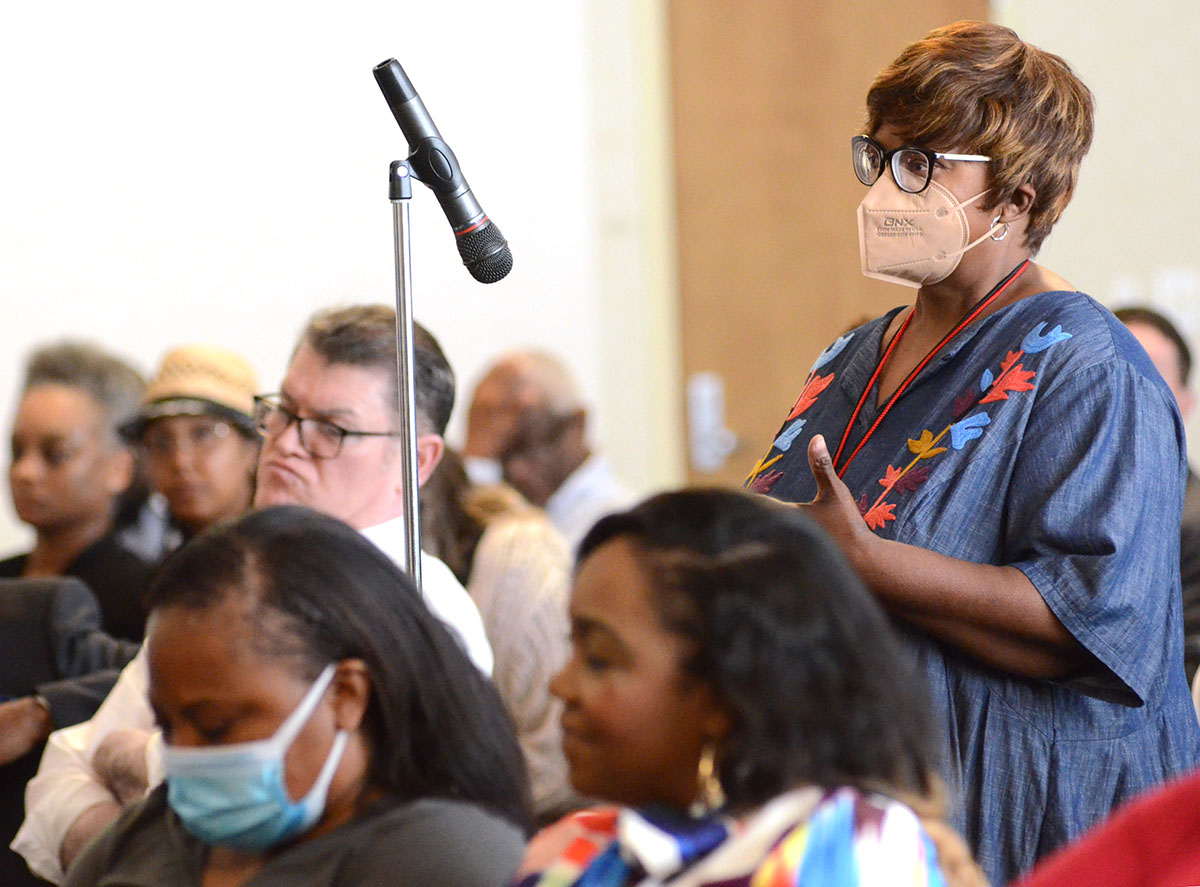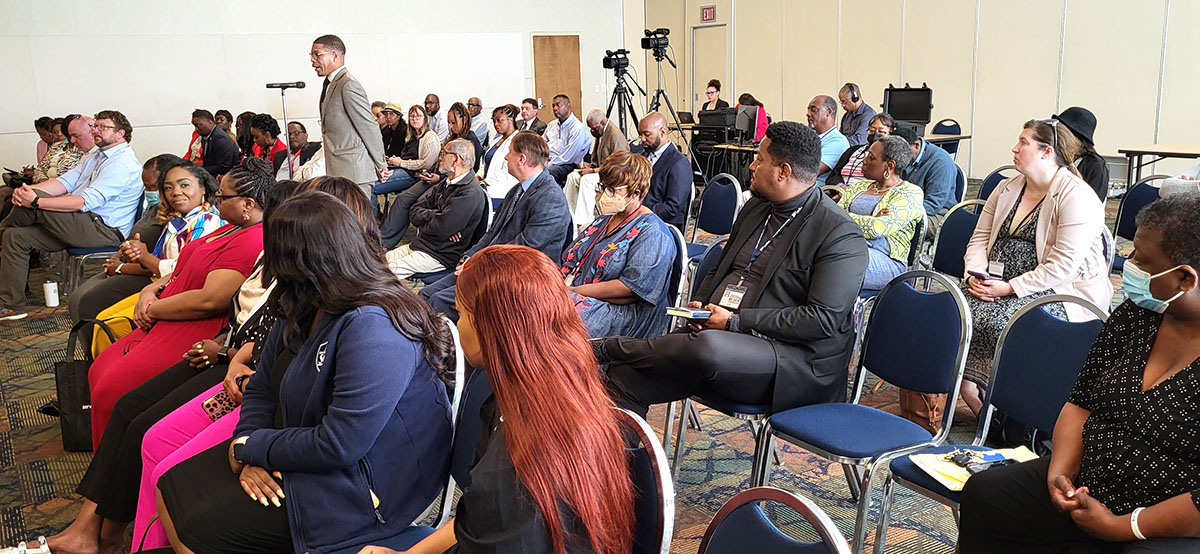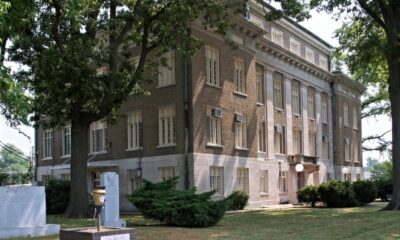Mississippi Today
‘Stop hiring your friends’: JSU community speaks up in listening session for next president

‘Stop hiring your friends': JSU community speaks up in listening session for next president
Students, faculty and staff made it clear at the listening session that the Institutions of Higher Learning Board of Trustees held on Jackson State University's campus Wednesday: Hire a permanent president whose tenure won't end in resignation like the last three.
In 2016, Carolyn Meyers resigned amid cratering finances. In 2020, William Bynum, Jr., resigned after he was arrested in a prostitution sting at a Clinton hotel.
And though nobody spoke former president Thomas Hudson's name, his resignation — for which the board still has not provided a detailed explanation — cast a shadow over the listening sessions, with many community members accusing the board of not doing its due diligence in his hiring.
Only one person mentioned he'd like to see Elayne Hayes-Anthony, JSU's temporary acting president, elevated to a permanent spot, though trustees did ask speakers not to name potential candidates as the board isn't yet at that point in the search.
Steven Cunningham, the trustee who is leading the search and the only JSU alumnus on the board, emphasized that he wants to hire a good president too.
“I'm not just here as an arbitrary member of the board,” he said during the student session. “This place means a lot to me.”
The board plans to do a national search. The listening sessions, which trustees will use to write a candidate profile, are the first step in that process. There's also a survey on IHL's website that will remain open until midnight on April 26.
Faculty and staff
The first listening session began on a low note. Etta Morgan, an associate professor in the criminal justice and sociology department, kicked it off: Morale among faculty is at an “all-time low” she said, even under the temporary administration.
“We are losing extremely good people,” she said. “Students have gotten to the point where they're cursing you out in the classroom. You write them up, nothing gets done … It's like we're being destroyed from the inside out.”
It's not just faculty at JSU who are turning over, speakers noted — so are the presidents. But not everyone at the faculty and staff session seemed to agree that presidential turnover has necessarily meant bad leadership. When Robert Luckett, the director of the Margaret Walker Center suggested that was the case, there was vocal disagreement from the audience.
“This is a level of instability that is deeply problematic for this institution.” Luckett said, adding that he had experienced “disastrous leadership” during his time at JSU.
“I wouldn't say that,” an audience member said. “That's your opinion!”
The next president needs to understand JSU is a special place in Mississippi, many faculty told trustees. Others said they felt like JSU no longer has the magic it once did.
LaKeisha Crye, an instructor and 2004 graduate, teared up as she told trustees that she didn't want to send her daughters to JSU. Even though faculty receive a tuition discount, and JSU has programs that her kids are interested in, Crye said she would spend more money at university with a safer campus.
Concerns about safety at JSU have become more frequent since the fall, when news made the rounds that a student was shot and killed on campus.
At times, faculty and staff chastised the board members. During a lull in speakers, Cunningham tried to encourage more people to go to the mic because the next president would “potentially be here for 15-20 years.”
Latoya Reed, a director in the division of student affairs, said if faculty and staff weren't talking, it was likely due to exhaustion and frustration with the board and its processes, not fear.
“I would like to charge the board first and foremost to not let this be routine, not let this be an average run of show,” she said.
Sophia Leggett, a faculty member who said she knew Cunningham when he was a student, called out IHL Commissioner Al Rankins.
“Be sincere, be intentional,” she said. “It's time out for games.”
Students
Multiple students talked about issues they'd like to see the next president improve, like campus safety, transparency from administration, and the ailing state of the buildings. There's mold across campus, students reported, tiles are falling off the wall in one classroom, and only two working stalls in liberal arts building bathroom.
“It's been broken for a couple months now, and it still hasn't been repaired, even if you scan the QR code and ask for repairs,” said Christi Madison Fortson, a senior psychology major.
Fortson also touched on a topic many students dodged, garnering some chuckles from the audience.
“In regards to the president,” she said, “I was hoping for some possibility of an extensive background check, just to make sure we get a president of the right mindset.”
The next administration needs to be more stable, many students said. Some noted they had experienced two, even three, presidents in their time at JSU. They said if the president sets the right tone, then their professors will be more inclined to stay longer.
Another big theme is students want a president who understands the culture of HBCUs.
Elijah Karriem, a senior and the secretary of JSU's NAACP chapter, noted that during the town halls — a fixture of student life during the water crises over the last few years — it felt like Hudson's administration was responding with prepared statements.
“We're all humans,” he said. “Don't read off the paper.”
Alumni and community
The alumni session was the longest and most critical of trustees.
Carrine Bishop, a faculty member whose family has deep roots at JSU, put it the most bluntly: “Stop hiring your friends,” she said to claps. “ We need to vet every individual.”
Several alumni warily asked the board to include them in the search process. Some referenced the 2017 search when IHL hired Bynum even though he did not receive a favorable review from the search committee.
“The only thing that we really ask is you give us a slate of candidates, not put someone in front of us and tell us that's who is going to lead our university,” said Patrease Edwards, the president of the alumni association.
Many alumni said they felt the board, and its presidents, have held JSU back from its true potential. Sen. Hillman Frazier, a Democrat who represents parts of Jackson, said lawmakers cite JSU's turbulent leadership as reasons not to provide more funding to the university.
The president of the neighborhood association near JSU said that he grew up seeing his neighbors sharecrop to afford to send their kids to JSU, but it doesn't seem like IHL gives back to them. He cited the dilapidated buildings that surround campus.
“My problem is this, the gatekeepers of this university will not allow the community to come in,” he said.
Donna Antoine-LaVigne, an alumnus, said she was tired of hearing news about scandals on the ninth floor, but that she wanted people to know that JSU was more than its president.
“The man or the woman does not make Jackson State,” she said. “Jackson state is Jackson State. It has a history in this community. It has done things for Black folk that nobody has thought about doing or has done.”
She called on Cunningham and Rankins to hire a president with vision.
“We have Black leadership with the board now — exercise it,” she said. “I'm not saying do anything special. Just do the right thing.”
This article first appeared on Mississippi Today and is republished here under a Creative Commons license.
Mississippi Today
On this day in 1950


MAY 16, 1950

Twenty Black families from South Carolina filed the lawsuit, Briggs v. Elliott, the first direct attack on the validity of the “separate but equal” doctrine in public schools.
The litigation was later combined with the successful Brown v. Board of Education case. The litigation might never have happened if not for the Rev. Joseph A. DeLaine, who accepted the NAACP's call to challenge the school bus transportation practices in Clarendon County, where Black students had to walk up to 8 miles to school.
“I realize that the stand that I take may cost me my job as a school teacher, but we need men,” he wrote.
Property owner Levi Pearson had previously sued, asking that school buses be provided for Black students. After his lawsuit failed on technical grounds, Thurgood Marshall approached DeLaine, saying he needed families for litigation, or the NAACP couldn't go any further.
After gathering the signatures of 107 parents and their children, economic pressure and violence followed. Despite this, 17 adults signed the petition again, and the lawsuit moved forward to trial. Evidence showed that South Carolina spent $221 annually for each white student, but only $45 for each Black student. White children had modern schools with a teacher for every grade. Meanwhile, Black children studied in wooden shacks, reading textbooks discarded by white students.
As a result of their activism, the Pearson family saw boycotts of their timber, and the Briggses were fired from their jobs. So were DeLaine and his wife. They saw their home and church burned to the ground. They were forced to leave the state after a drive-by shooting. In 2003, the families of DeLaine, Levi Pearson and the Briggses received Congressional Gold Medals for their courage.
This article first appeared on Mississippi Today and is republished here under a Creative Commons license.
Did you miss our previous article…
https://www.biloxinewsevents.com/?p=358956
Mississippi Today
PSC axes solar programs in light of EPA funds, advocates file lawsuit
Advocates from some of the state's conservation groups — such as Audubon Delta, Mississippi Sierra Club and Steps Coalition — spoke out Wednesday against a recent decision by the Mississippi Public Service Commission to suspend several solar programs, including “Solar for Schools,” less than two years after the previous commission put them in place.
“This is particularly disappointing because the need for these incentives in the state of Mississippi is significant,” said Jonathan Green, executive director of Steps Coalition. “Energy costs in the South, and in particular the region known as the Black Belt, are higher than those in other parts of the country for a number of reasons. These regions tend to have older energy generation infrastructure, and housing that has not been weatherproofed to modern standards. For many low- to moderate-income residents in the state of Mississippi, energy burden and energy insecurity represent real daily economic challenges.”
The PSC voted 2-1 at its April docket meeting to do away with the programs, reasoning in part that new funds through the Inflation Reduction Act would be available to the state. About 10 days later, the Environmental Protection Agency awarded $62 million to the state, through the Hope Enterprise Corporation, to help low-income Mississippians afford adding solar power to their homes. The funds are part of the Biden Administration's Solar for All program, one of the several recent federal initiatives aimed at reducing greenhouse gas emissions.
The PSC decision ended three programs the previous commission put in place to encourage wider adoption of solar power through the two power companies it regulates, Entergy Mississippi and Mississippi Power: “Solar for Schools,” which allowed school districts to essentially build solar panels for free in exchange for tax credits, as well as incentives for low-income customers and battery storage.
Last Friday, the Sierra Club filed lawsuits in chancery courts in Hinds and Harrison counties against the commission, arguing the PSC broke state law by not providing sufficient reasoning or public notice before making the changes. Advocates also argued that new funding going to Hope Enterprise won't go as far without the PSC's low-income incentives.
The programs were part of a 2022 addition to the state's net metering rule, a system that allows homeowners to generate their own solar power and earn credits for excess energy on their electric bills. Mississippi's version is less beneficial to participants than net metering in most states, though, because it doesn't reimburse users at the full retail cost. Mississippi's net metering program itself is still in tact.
Northern District Commissioner Chris Brown said that, while he supported efforts to expand solar power, he didn't think programs that offer incentives from energy companies were fair to other ratepayers.

“It's the subsidy that we take issue with,” Brown said at the meeting. “It's not the solar, it's not the helping the schools. We just don't think it's good policy to spread that to the rest of the ratepayers.”
Brown and Southern District Commissioner Wayne Carr voted to end the programs, while Central District Commissioner De'Keither Stamps voted against the motion. All three are in their first terms on the PSC. Brown's position is in line with what the power companies as well as Gov. Tate Reeves have argued, which is that programs like net metering forces non-participants to subsidize those who participate.
Robert Wiygul, an attorney for the Mississippi Sierra Club, countered that argument during Wednesday's press conference, saying that net metering actually helps non-participants by adding more power to the grid and reducing the strain on the power companies' other infrastructure. Moreover, he said, the PSC hasn't offered actual numbers showing that non-participants are subsidizing the program.
“Look, if the commission wants to talk about that, we are ready to talk about it,” Wiygul said. “But what we got here is a situation where these two commissioners just decided they were going to do this. We don't even know what that claim is really based on because it hasn't been through the public notice and hasn't been through the public comment process.”
While no schools had officially enrolled in “Solar for Schools,” which went into effect in January of last year, Stamps told Mississippi Today that there were places in his district getting ready to participate in the very programs the PSC voted to suspend.

“My issue was we should have talked to the entities that were going through the process to (understand what they were doing) to participate in the programs before you eliminate the programs,” he said.
Several school districts in the state are already using solar panels thanks to funding from a past settlement with Mississippi Power. Officials there told Mississippi Today that the extra power generated from the panels has freed up spending for other educational needs. During the public comment period for the 2022 net metering update, about a dozen school district superintendents from around the state wrote in to support the initiative. Ninety-five school districts in the state would have been eligible for the program because they receive power from Entergy Mississippi or Mississippi Power.
Former commissioner Brent Bailey, who lost a close reelection bid in November to Stamps, was an advocate for the schools program that the PSC created while he was there. At the April docket meeting, he pleaded with the new commission to reconsider, arguing that the new federal funding won't have the same impact without those programs.
“My ask is to at least give this program a chance, see where it goes, and hear from stakeholders that have participated,” Bailey said. The solar programs, he added, weren't just about expanding renewable energy, but taking advantage of a growing economy around solar power as well: “We can just stand by and watch it go by, or we can participate in this and bring economic development to the state.”
This article first appeared on Mississippi Today and is republished here under a Creative Commons license.
Crooked Letter Sports Podcast
Podcast: In or out (of the NCAA Tournament)?

College baseball's regular season is in its last week, which means baseball bracketology is a popular activity. State needs to finish strong to become a Regional host. Southern Miss probably has already punched its ticket as a 2- or 3-seed. Ole Miss, playing its best baseball presently, needs victories, period. Meanwhile, the State High School softball tournament is this week in Hattiesburg, and the state baseball tournament comes to Trustmark Park in Pearl next week.
Stream all episodes here.
This article first appeared on Mississippi Today and is republished here under a Creative Commons license.
Did you miss our previous article…
https://www.biloxinewsevents.com/?p=358148
-
SuperTalk FM3 days ago
Martin Lawrence making 3 stops in Mississippi on comedy tour
-
Our Mississippi Home2 days ago
Beat the Heat with Mississippi’s Best Waterparks
-
Mississippi Today6 days ago
Lawmakers may have to return to Capitol May 14 to override Gov. Tate Reeves’ potential vetoes
-
Mississippi News7 days ago
Man arrested for allegedly breaking into home, robbing owner
-
SuperTalk FM7 days ago
Couple arrested after husband received unemployment benefits while in prison
-
Mississippi News Video5 days ago
Local dentists offer free dental care in Amory
-
Our Mississippi Home3 days ago
Charlie’s U-Pik: Opening Soon for the Summer Season
-
Mississippi News6 days ago
Bond set for West Point couple accused of killing their child









































